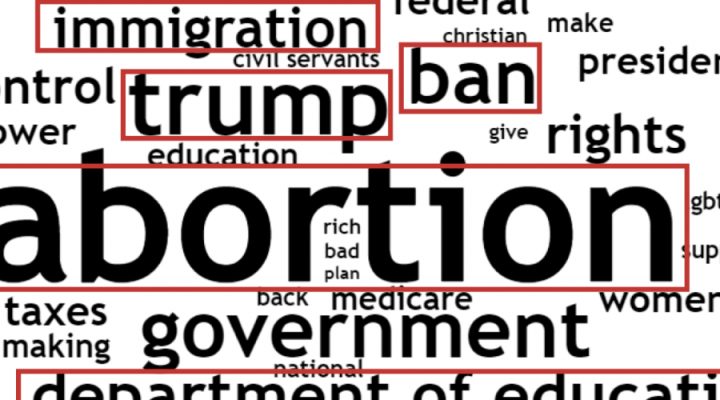Religion will no doubt continue to play a major role in American society after the 2024 election, but whether that role will be one of oppression or liberation remains to be seen, Interfaith Alliance President Paul Raushenbush said.
The authoritarian version of faith is that of Christian nationalism and its embodiment in Project 2025, the conservative scheme to replace democracy with a “biblically based” nation ruled by a white-supremacist Christian government.

Paul Raushenbush
“If we go down the road of Project 2025, religion has a role to play in creating a theocracy, something where one small sliver of American religious tradition gets to dictate to everyone else what goes,” said Raushenbush, president of Interfaith Alliance and moderator of a recent webinar featuring panelists Skye Perryman and Guthrie Graves-Fitzsimmons.
The alternative is what he called “Promise 25,” which presents a version of faith that nurtures democracy by extolling freedom over tyranny and education over indoctrination.
“The idea is that we will show up for one another across the religious landscape, including atheists, humanists, agnostics, as well as Hindu, Jains, Sikhs, Muslims, Jews and Christians,” he said. “And it’s recognizing that religion can be a bridge and not a bludgeon, and that religion can be a cause for celebration, not discrimination.”
“Religion can be a bridge and not a bludgeon.”
It also would involve reclaiming the meaning of religious freedom from those who assert it is a right for white, conservative Christians to receive tax dollars, ban books, suppress voters, restrict abortion access and threaten the rights of Black, brown and LGBTQ people.
“Freedom of religion can mean to read what we want to read and read the real history of our country,” he said. “Freedom of religion can mean voting without intimidation and suppression. The vote is almost sacred, (late Congressman and Civil Rights leader) John Lewis said, and voting is a freedom of expression, freedom of religion. We have to recognize that yes, freedom of religion is important but it doesn’t mean you can do anything to anybody.”

Skye Perryman
Elements of the 900-page Project 2025 already are being implemented piecemeal in various states, said Perryman, an alliance board member and CEO of Democracy Forward, a national legal organization dedicated to fighting to preserve democracy.
Examples include a Louisiana law mandating displays of the Ten Commandments in all public classrooms, Oklahoma’s decree that school teachers teach from the Bible and Florida’s aggressive school library book bans, restrictive abortion ban and attempts to censor media outlets.
The Heritage Foundation and its partners behind Project 2025 are seeking to ban medication abortion, were behind the overturn of Roe v. Wade and racial equity protections and are actively engaged in voter suppression and election denialism campaigns, Perryman said.
A Trump return to the White House would accelerate the project’s goal of “undermining the basic personnel of the federal government, how our laws get implemented and how programs get implemented across the country, and seeking to roll back reproductive rights, LGBTQ rights and economic justice,” she added.
The potential consequences of Project 2025 also may be discerned by examining the list of the foundation’s partners, which comprise “a who’s who of Christian nationalism,” said Graves-Fitzsimmons, senior director of policy and advocacy with Interfaith Alliance.
They include the Alliance Defending Freedom, the First Liberty Institute, the American Center for Law and Justice, Liberty University and Hillsdale College, he said. “These are the legal advocacy groups and the kind of conservative religious-right think tanks that have been shaping the Christian nationalist agenda, undermining our rights in the courts and trying to put forward this false myth that we’re a Christian nation and that Christians should be privileged in law and policy.”
“If authoritarianism comes to the United States, it will be done in the name of Christianity and these groups will be on the front lines cheering it on.”
Christian nationalism provides a permission structure enabling these and other groups to promote restrictive policies disguised as efforts to stop “woke” progressives from taking over the nation, Graves-Fitzsimmons said. “If authoritarianism comes to the United States, it will be done in the name of Christianity and these groups will be on the front lines cheering it on, saying, ‘You may not like some of these checks and balances, and some of these tactics may seem extreme, but we’re doing it to restore God to the public square.’”
Project 2025 targets the Respect for Marriage Act, which codified same-sex marriage, and would restrict the application of Bostock v. Clayton County, a 2020 Supreme Court decision barring employment discrimination against LGBTQ job applicants and employees, he said.

Guthrie Graves-Fitzsimmons
“The vast majority of almost every religious group in this country supports non-discrimination protections for LGBTQ people,” he added. “The Christian nationalist view, as put into writing in Project 2025, is putting a very narrow, restrictive, far-right extremist view of Christianity into law and policy that most American Christians and people of other faiths do not want across the board.”
Project 2025 also seeks to federalize anti-abortion laws that would affect access to in vitro fertilization and contraception access, he added. The goal is a “backdoor nationwide abortion ban to reverse the approval of medication abortion and limit emergency contraception. Again, this narrow view of Christian extremism and Christian nationalism does not reflect the views of most religious Americans.”
Conservatives behind the effort also want to dismantle public education and funnel those and other federal dollars to like-minded religious institutions, he continued. “This full-on embrace of Christian nationalism represents a very small amount of the American population, but it is very well organized. It is very well funded. There are many groups making these arguments. They have a strong impact in the courts [and] in Congress.”
Only 9% of Americans have a favorable view of Project 2025.
An October Navigator Research survey found only 9% of Americans have a favorable view of Project 2025.
However the election goes, Perryman said she finds solace in the fact the country has faced “the dark side of human nature” and weathered previous attempts to weaken democracy and constitutional freedoms.
She cited McCarthyism as an example. That is the 1950s political movement that hyped anti-communist fervor to create the Red Scare, fueled anti-communist witch hunts and threatened due process during the early and mid-1950s.
“It took people of great courage in that time to do the right thing and to stand up for their country in small ways and in larger ways in their communities,” she said. “This was not something that was just in the halls of Congress. It was about how you interacted at your school board meeting, how you interacted in your community.”
While Democracy Forward and partners stand ready to challenge future attempts to implement Project 2025, she urged those watching the webinar to remember it is every American’s responsibility to speak up for democracy when it is imperiled.
“The thing that gives me hope is that we have gotten through these points where you only get to keep democracy if you are willing to keep it and if you try to keep it.”
Related articles:
Perryman testifies about dangers of Project 2025
On secretly recorded video, leader of Project 2025 says Trump is still in on the plan
What a word cloud generator sees in Project 2025 | Analysis by Mara Richards Bim


